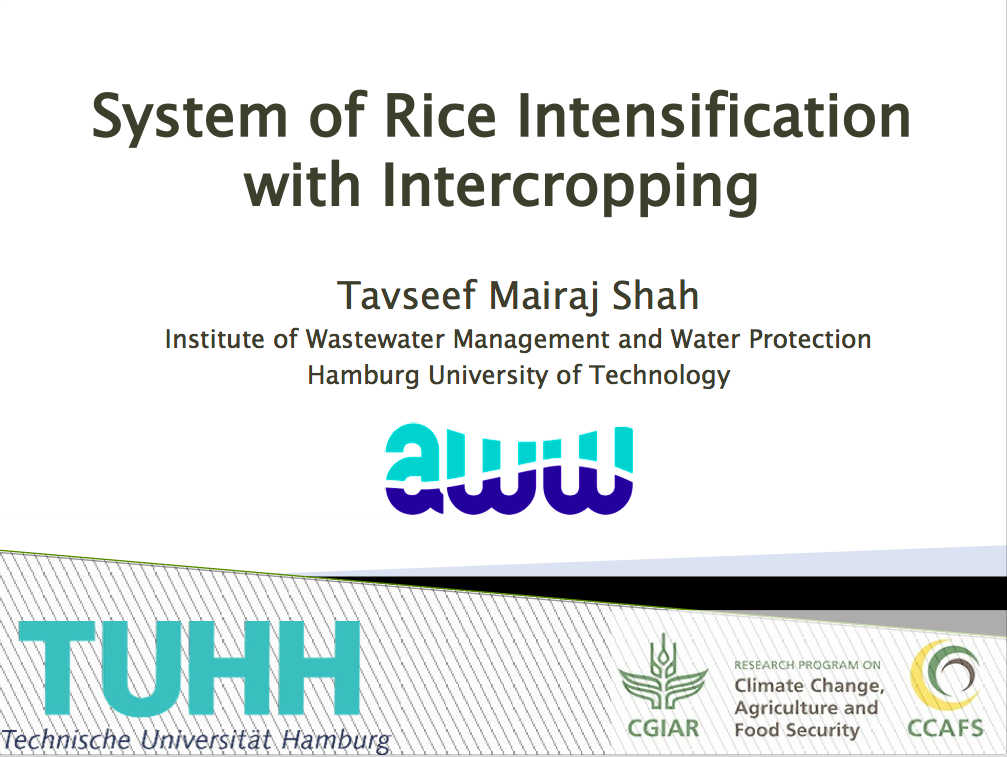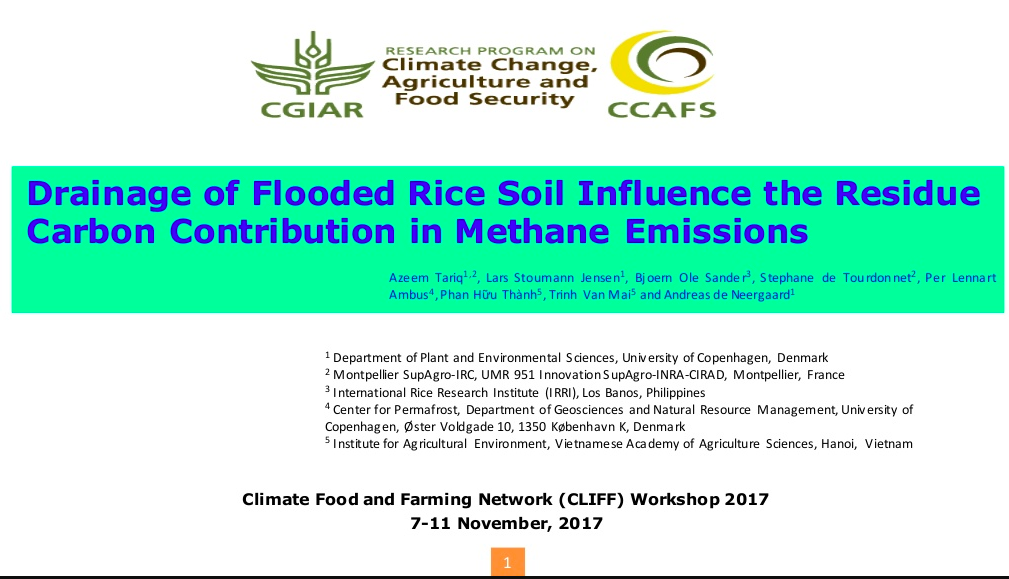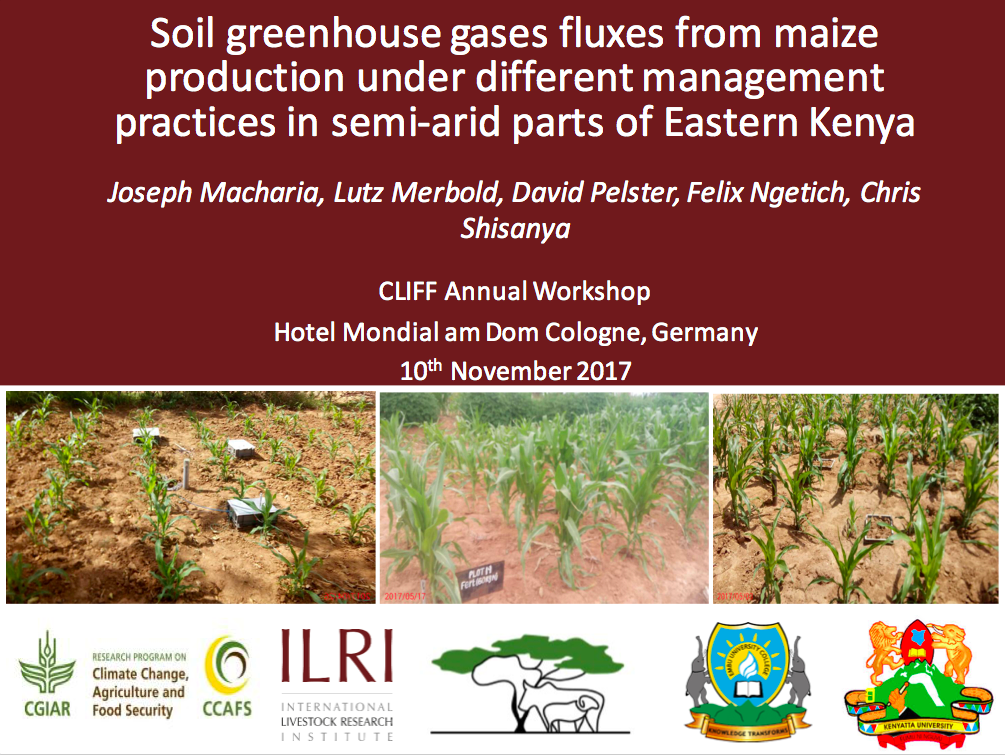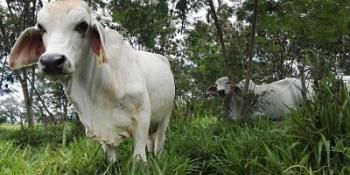Expanding young researchers’ knowledge on options for reducing agricultural emissions
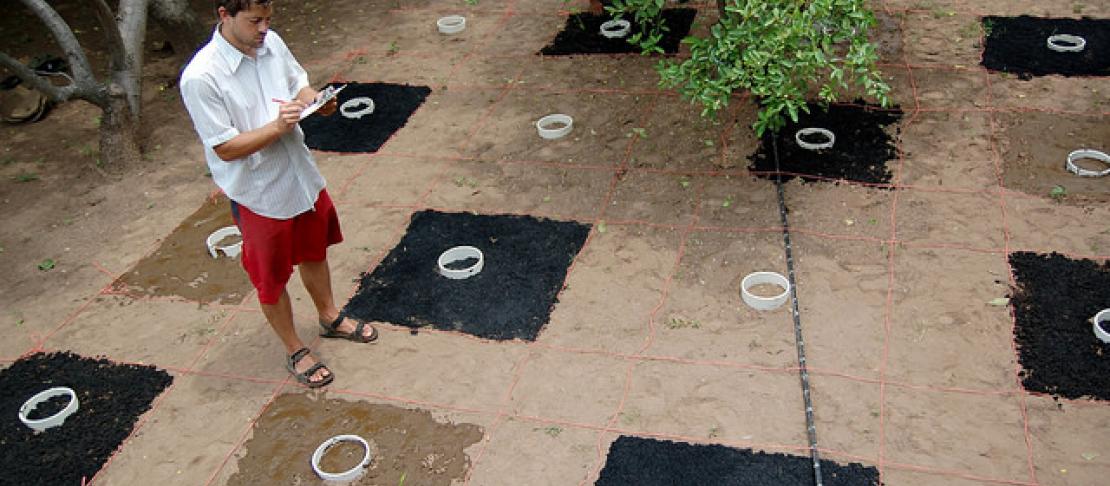
Climate, Food and Farming Network students presented current research on climate change mitigation in agriculture in November, as CLIFF call for 2018 opens.
Climate change caused by the increase of greenhouse gases (GHGs) in the atmosphere is a global concern. Over the years, efforts to tackle climate change have brought together delegates from around the world to discuss how to solve the unprecedented problems with global warming that the world is experiencing. Diplomats, scientists and civil society representatives from around the world convened in Bonn, Germany for the 23rd annual Conference of Parties (COP23) under the UN Framework Convention on Climate Change (UNFCCC). This year, main topics included agriculture, food security and local knowledge.
In line with the goals of the UNFCCC COP23, the Climate, Food and Farming Network (CLIFF) provided grants to support scientific training of PhD students from developing countries. This is a great opportunity for students from developing countries to excel their knowledge and skills towards low emission agriculture. The 2017 CLIFF workshop was held in Cologne, Germany alongside of COP23 for 11 students from five developing countries (Nepal, Vietnam, India, Colombia and Kenya).
CLIFF students present at workshop
CLIFF students conducted research on reducing GHG emissions from maize, rice and rice-based cropping systems using different water and nutrient management options and from livestock using diet management practices. During the workshop, CLIFF students presented their research work, shared their experiences from scientific training visits and received valuable inputs from fellow grantees and scientists. CLIFF students’ presentations are summarized and linked below.
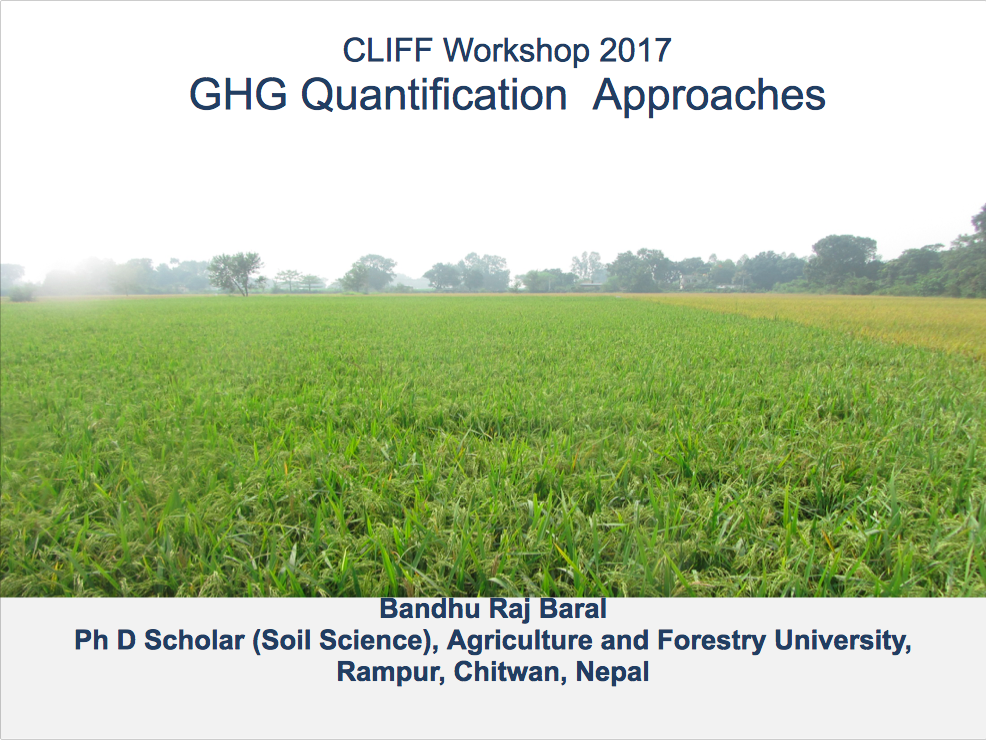 Bandhu Raj Baral, a PhD scholar from Nepal, attended scientific research training at the International Maize and Wheat Improvement Center (CIMMYT) in New Delhi, India. He presented on the topic of use of empirical tools or calculators to quantify greenhouse gas emissions from agricultural systems.
Bandhu Raj Baral, a PhD scholar from Nepal, attended scientific research training at the International Maize and Wheat Improvement Center (CIMMYT) in New Delhi, India. He presented on the topic of use of empirical tools or calculators to quantify greenhouse gas emissions from agricultural systems.
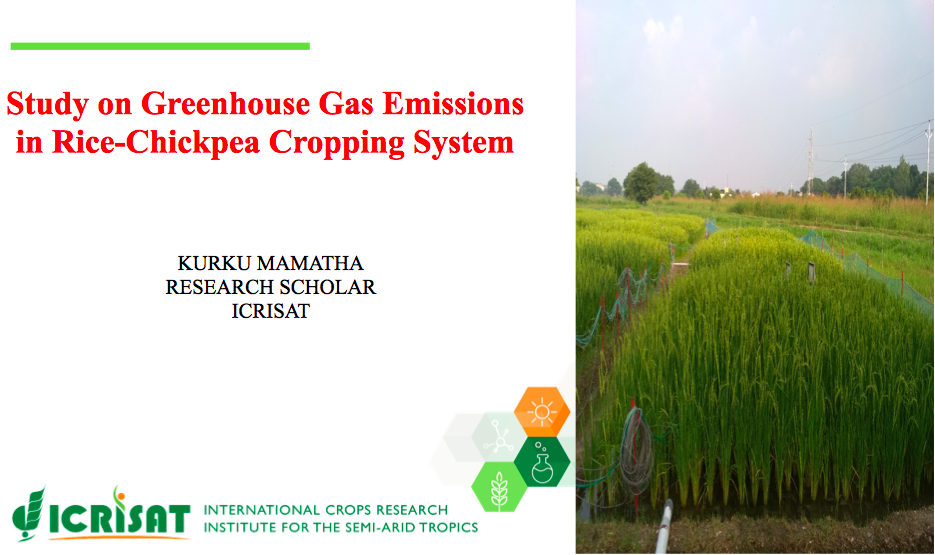 Kurku Mamatha, a PhD scholar at the Professor Jayashankar Telangana State Agricultural University, gained scientific training at the International Crops Research Institute for the Semi-Arid Tropics (ICRISAT), India. She presented her research on monitoring greenhouse gas emissions in rice-chickpea cropping systems using high frequency automatic sampling system to give precise data with high frequency.
Kurku Mamatha, a PhD scholar at the Professor Jayashankar Telangana State Agricultural University, gained scientific training at the International Crops Research Institute for the Semi-Arid Tropics (ICRISAT), India. She presented her research on monitoring greenhouse gas emissions in rice-chickpea cropping systems using high frequency automatic sampling system to give precise data with high frequency.
Tavseef Mairaj Shah, PhD scholar, received his scientific training at CIMMYT in New Delhi, India. He presented on the system of rice intensification with intercropping and its relevance to increase yield potential and decrease greenhouse gas emissions in Kashmir region.
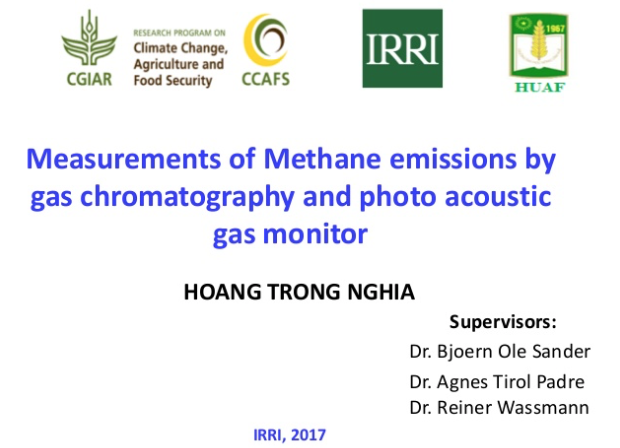
Phan Huu Thanh, a PhD scholar, attended scientific training at the International Rice Research Institute (IRRI) in the Philippines. He presented his research on how drainage of flooded rice soils influences residue carbon contribution in methane emissions.
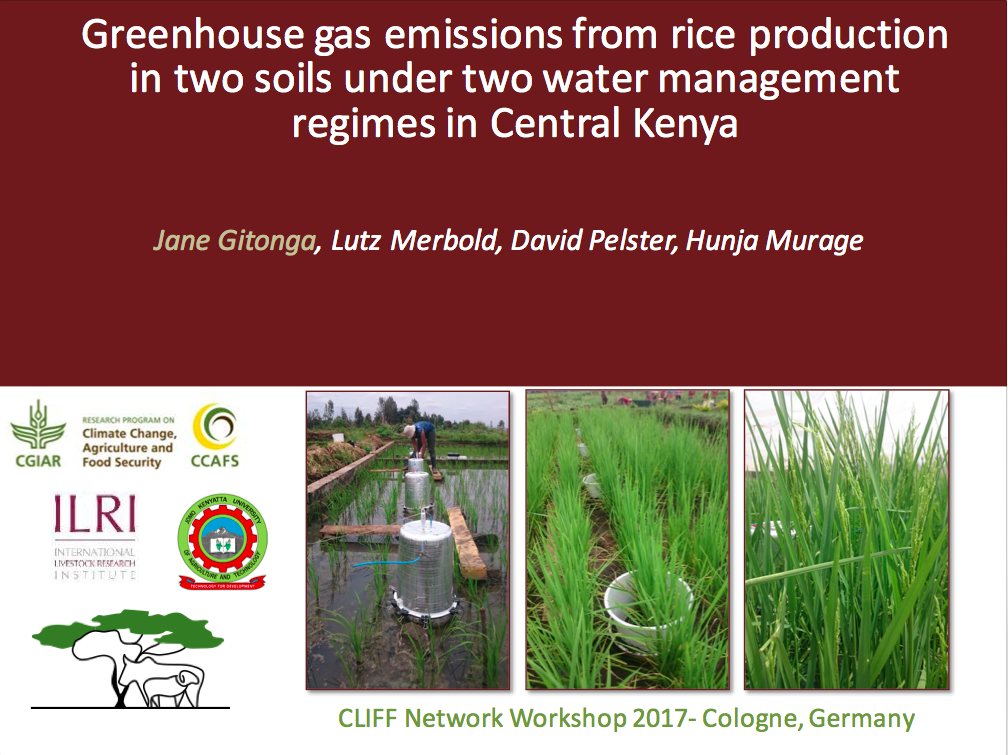
Jane Gitonga, MSc student, attended scientific training at the International Livestock Research Institute (ILRI) in Kenya. She presented her research on greenhouse gas emissions from rice production in two types of soils under two water management regimes in central Kenya.
Joseph Macharia, a PhD scholar from Kenya, presented his work on soil greenhouse gas fluxes from maize production under different management practices in semi-arid parts of eastern Kenya. He received research training at ILRI in Kenya.
Sandra Durango Morales, from Colombia, presented her research work on legume inclusion in cattle feed as a strategy to reduce nitrous oxide emissions in low tropical conditions. She received research training at the International Center for Tropical Agriculture (CIAT) in Colombia.
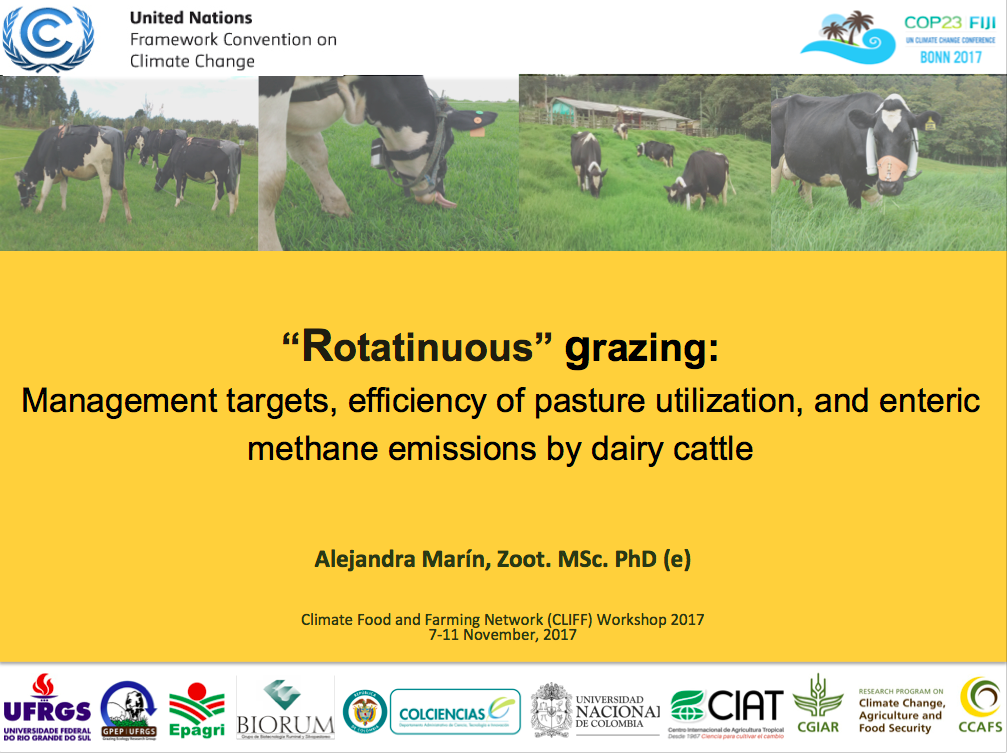 Alejandra Marin, a PhD research scholar from Colombia, attended scientific training at University of Rio Grande do Sul (UFRGS). She presented her research on intensification of forage-based systems, improved animal production and feed efficiency, and strategies to mitigate enteric methane emissions from dairy cattle.
Alejandra Marin, a PhD research scholar from Colombia, attended scientific training at University of Rio Grande do Sul (UFRGS). She presented her research on intensification of forage-based systems, improved animal production and feed efficiency, and strategies to mitigate enteric methane emissions from dairy cattle.
Isabel Cristina Molina, PhD research scholar from Colombia, attended scientific training at the Autonomous University of Yucatan in Mexico and CIAT in Colombia. She presented research on the potential of the Enterolobium cyclocarpum pod and legume Gliricida sepium for enteric methane mitigation.
Presentations and learning from experts in low emissions agriculture
In addition to CLIFF students’ presentations, a number of experts delivered presentations. Researcher’s interaction and sharing knowledge was a highlight of the workshop for CLIFF students. Meryl Richards, low emissions development Science officer at CCAFS, facilitated the workshop. Anette Friis, Head of partnerships and outreach for CCAFS, outlined a brief history of the global negotiations on climate change, why COP21 in Paris succeeded, and what to expect at COP23.
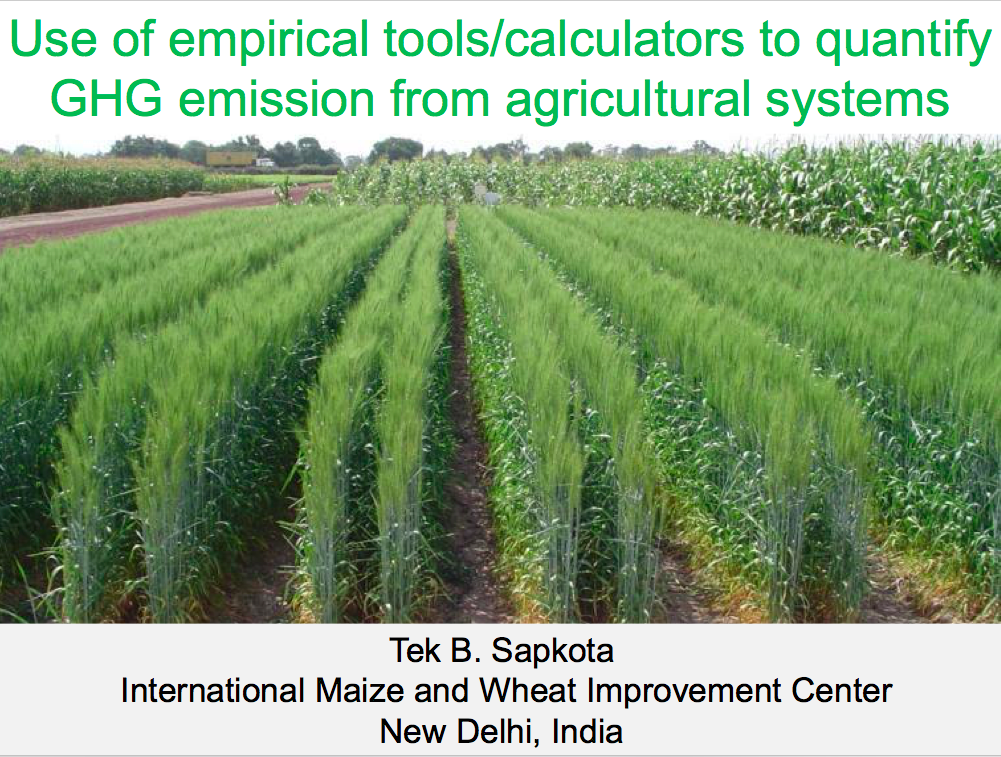 Students learned about the use of the CCAFS Mitigation Options Tool (MOT) & Cool Farm Tool (CFT) to quantify greenhouse gas emissions from agriculture during a virtual presentation given by Tek Sapkota, scientist with CIMMYT. Both tools are farmer-focused, excel-based, freely accessible, and open source.
Students learned about the use of the CCAFS Mitigation Options Tool (MOT) & Cool Farm Tool (CFT) to quantify greenhouse gas emissions from agriculture during a virtual presentation given by Tek Sapkota, scientist with CIMMYT. Both tools are farmer-focused, excel-based, freely accessible, and open source.
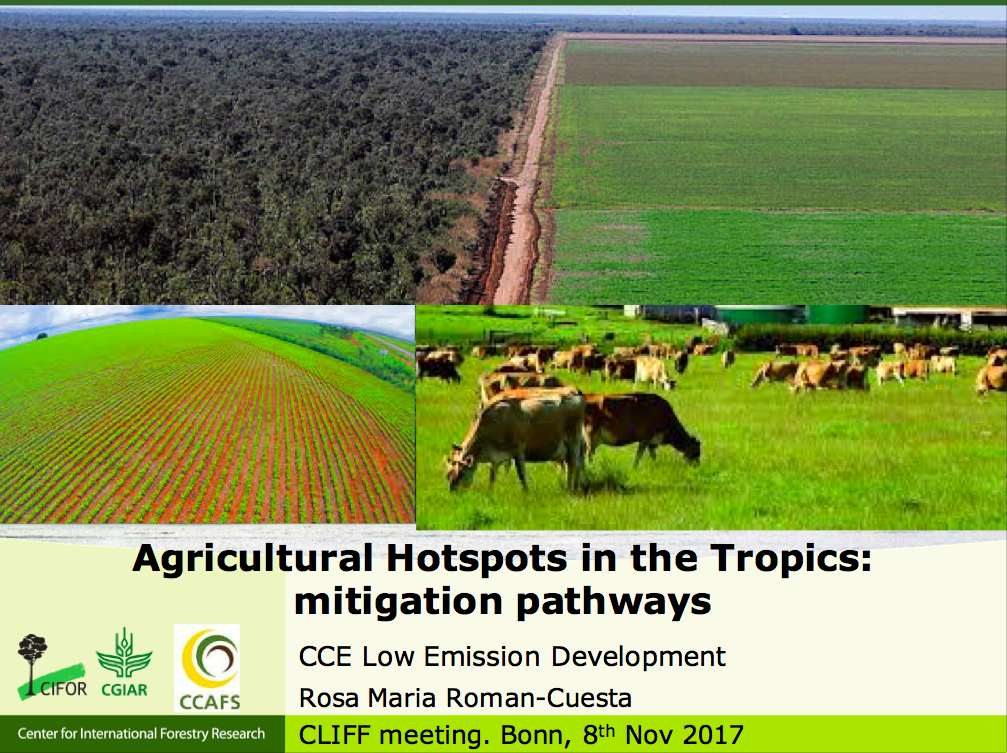 Rosa Roman Cuesta, scientist at the Center for International Forestry Research (CIFOR), presented on global hotspots of agricultural greenhouse gas emissions. She emphasized that that the agriculture, forestry and other land use (ALOFU) sector is responsible for approximately 10-12 GtCO2eyr-1 of the anthropogenic GHG emissions (Smith et al. 2014). Her session was interactive; students contributed to the discussion by identifying two countries on each continent and their agricultural greenhouse gas emission sources and mitigation potentials.
Rosa Roman Cuesta, scientist at the Center for International Forestry Research (CIFOR), presented on global hotspots of agricultural greenhouse gas emissions. She emphasized that that the agriculture, forestry and other land use (ALOFU) sector is responsible for approximately 10-12 GtCO2eyr-1 of the anthropogenic GHG emissions (Smith et al. 2014). Her session was interactive; students contributed to the discussion by identifying two countries on each continent and their agricultural greenhouse gas emission sources and mitigation potentials.
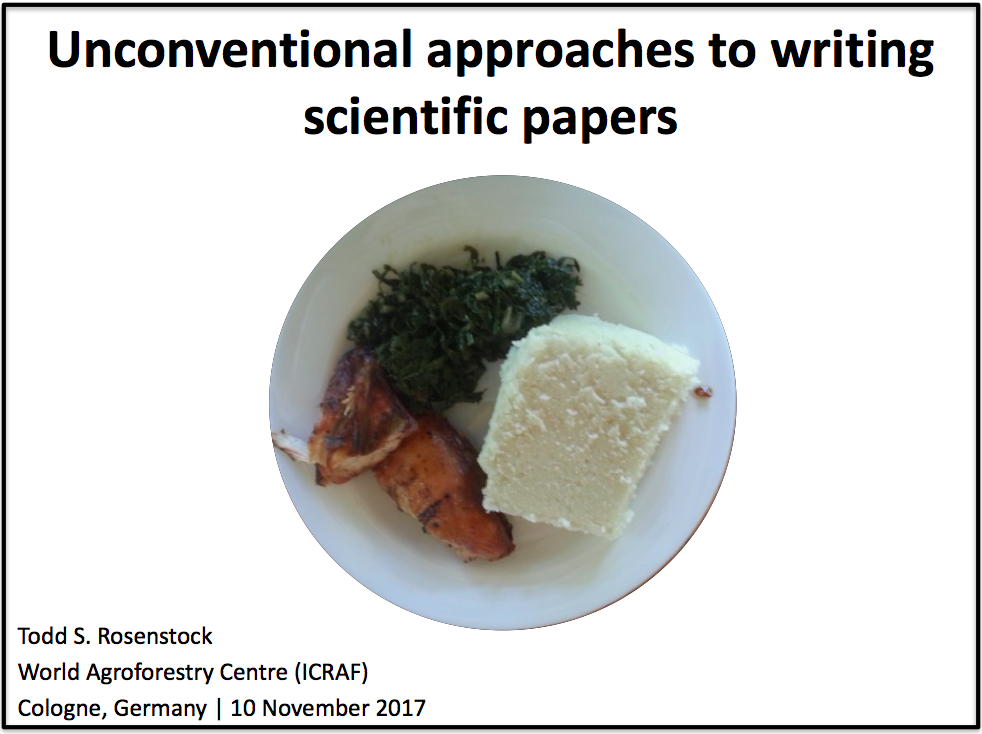 Todd Rosenstock, scientist with the World Agroforestry Centre (ICRAF) gave a very informative presentation on how to write and publish a fantastic research paper. As many young researchers struggle with this, the presentation was very helpful. “Learning to write takes time and practice, if you want to be a scientist, you have to be a good writer,” Rosenstock said.
Todd Rosenstock, scientist with the World Agroforestry Centre (ICRAF) gave a very informative presentation on how to write and publish a fantastic research paper. As many young researchers struggle with this, the presentation was very helpful. “Learning to write takes time and practice, if you want to be a scientist, you have to be a good writer,” Rosenstock said.
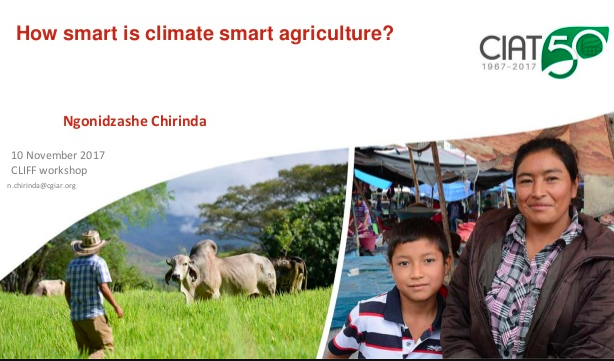 Ngonidzashe Chirinda, scientist at CIAT, virtually presented about “How smart is climate-smart agriculture.” He reviewed the goals of climate-smart agriculture: reduce greenhouse gas emissions from agriculture, adapt agriculture to climate change, and sustainably increase productivity. Chirinda described three examples of how he has seen climate-smart agriculture used effectively. He found:
Ngonidzashe Chirinda, scientist at CIAT, virtually presented about “How smart is climate-smart agriculture.” He reviewed the goals of climate-smart agriculture: reduce greenhouse gas emissions from agriculture, adapt agriculture to climate change, and sustainably increase productivity. Chirinda described three examples of how he has seen climate-smart agriculture used effectively. He found:
- The practice of alternate wetting and drying (AWD) in rice systems in Colombia reduced methane emissions. He noted that engaging women was important to increase uptake of AWD by farmers.
- Using cassava leaves for feed reduces enteric methane emissions from livestock.
- Engaging farmers not as recipients, but as partners in practicing mitigation options, is effective.
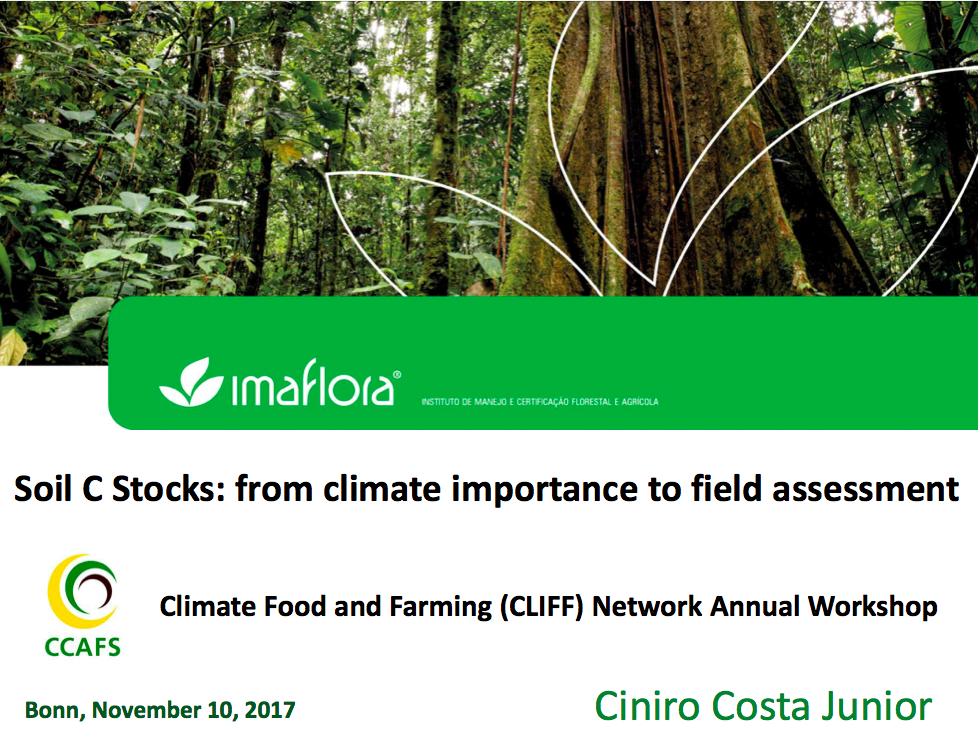 Ciniro Costa Jr., a scientist from IMAFLORA presented on various approaches for determining soil carbon storage rates. Jacobo Arango, scientist from CIAT, presented on quantifying mitigation potential in livestock systems, in particularly the RUMINANT model, noting that sustainable livestock production can reduce greenhouse gas emissions by sparing land from deforestation.
Ciniro Costa Jr., a scientist from IMAFLORA presented on various approaches for determining soil carbon storage rates. Jacobo Arango, scientist from CIAT, presented on quantifying mitigation potential in livestock systems, in particularly the RUMINANT model, noting that sustainable livestock production can reduce greenhouse gas emissions by sparing land from deforestation.
Bringing knowledge back home
The workshop provided opportunities for students to interact and share ideas, learn from each other, and network with experts. Students increased understanding of climate change mitigation in crop and livestock systems globally. They know now that there are low-cost models and tools to study greenhouse gas emissions (Ruminant, CCAFS-MOT, Cool Farm Tool) that can help their countries achieve climate change mitigation in agriculture.
The CLIFF grant has provided the students the opportunity to be part of ongoing global research to identify climate change mitigation options for agriculture. The new skills and knowledge they gained from the training received at host research centers and the CLIFF workshop 2017 will inform both their studies and their careers.
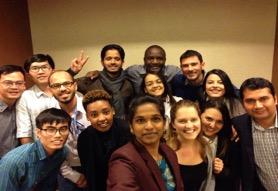
CLIFF workshop grantees and experts at annual workshop. Photo: Mamatha Kurku
The call for applications for 2018-2019 CLIFF-GRADS students is open until 31 December 2017.
Jane Gitonga, Sandra Durango, Kurku Mamatha, and Isabel Cristina Molinaare are 2016-2017 recipients of CLIFF grants.
